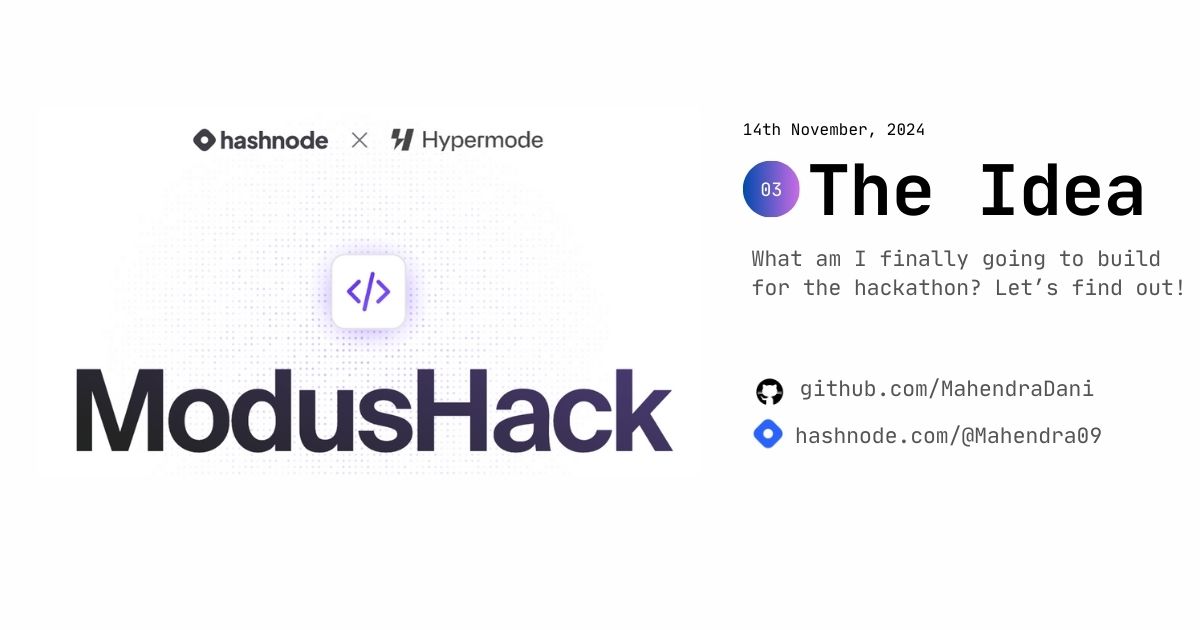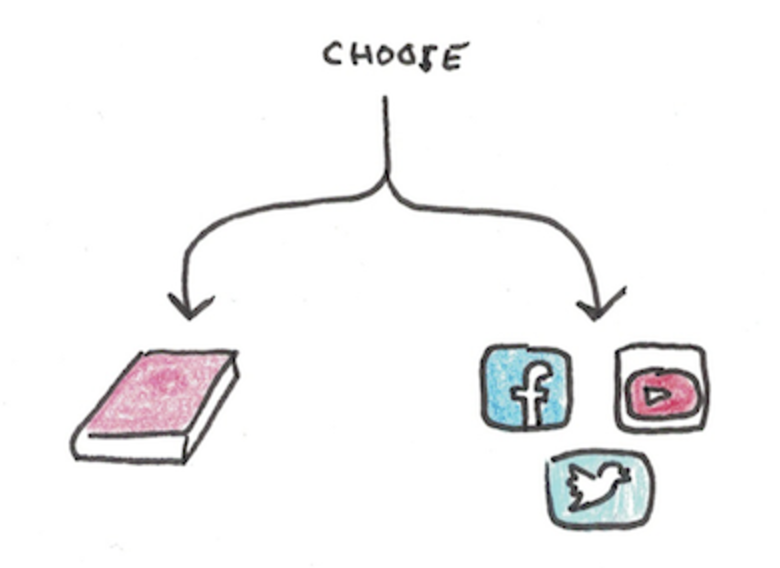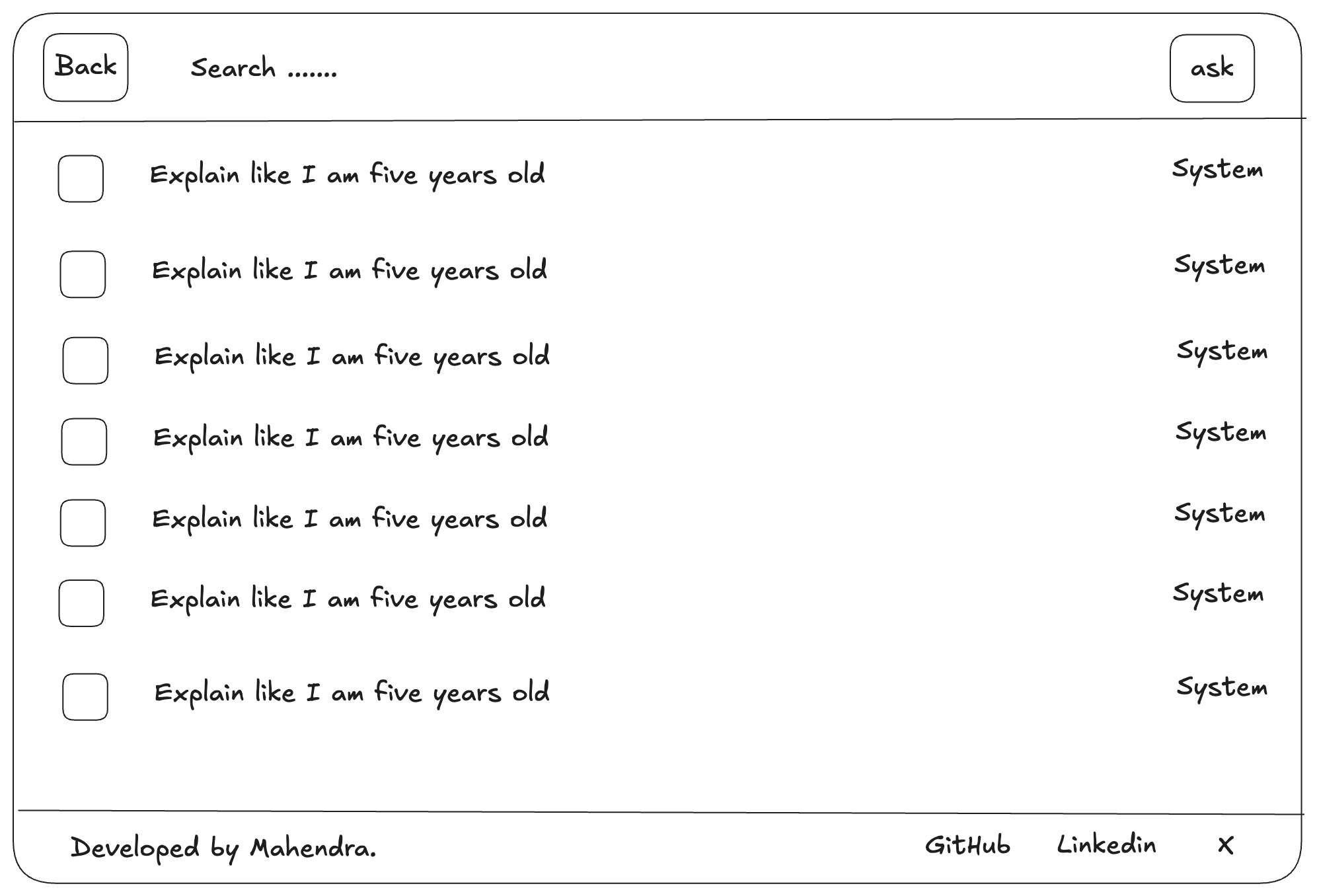ModusHack: The Idea
 Mahendra Dani
Mahendra Dani
I embarked on this exciting journey of joining ModusHack, diving into the world of Modus and Hypermode. I researched countless articles, scoured through documentation, and watched YouTube tutorials, yet something was still eluding me. Can you guess what it was? Yes, the project idea!
The vision
Dr. Richard Hamming, the third recipient of the Turing Award, writes in his book The Art of Doing Science and Engineering :
It is well known the drunken sailor who staggers to the left or right with N independent random steps will, on the average, end up about steps sqrt(N) from the origin. But if there is a pretty girl in one direction, then his steps will tend to go in that direction and he will go a distance proportional to N. In a lifetime of many, many independent choices, small and large, a career with a vision will get you a distance proportional to N, while no vision will get you only the distance sqrt(N). In a sense, the main difference between those who go far and those who do not is some people have a vision and the others do not and therefore can only react to the current events as they happen.
I believe that the project idea should be about more than just winning the hackathon. Even with all the repetitive patterns and hidden cues, we often overlook problems. However, hackathons inspire innovation. The organizers seek projects that genuinely solve problems and have the potential to positively impact our lives. Hackathons are a fantastic way to bring these exciting ideas to life. As mentioned, having a vision is essential.
Initial thoughts
So I read my notes on the articles, docs and videos which I researched extensively. I read articles on Hack this Fall, understanding the lifecycle of hackathons in depth.
I brainstormed ideas keeping in mind:
The idea should either solve a new problem or give pleasure than an existing solution.
Shortlist the problems that I face everyday.
Inspiration is everywhere.
Play the theme.
Trust me, countless ideas come to mind, but not all address a genuine problem or are entirely original. As you explore further, you'll realise you're not the first to think of that idea, and there are often several existing solutions. So, how do you determine which idea is truly worthwhile?
Nevertheless, I relentlessly searched for problems, difficulties, and inefficiencies. As days passed and pressure mounted, even more than 10 days into the hackathon, I still had no idea.
The Rendezvous
I was reading some articles on the internet and I was overwhelmed and confused. Juggling around multiple tabs, and trying to understand complex topics. I stopped suddenly. Leaned back in my chair and realised a pattern in my reading.
Whenever I didn’t understood any section, or I wanted to use a article for reference I found myself copying chunks of texts/paragraphs from website and using LLMs (ChatGPT, Claude, Gemini) and rewriting the same prompts: “What is the meaning of the above text”, “What are the key points?” , “Rephrase the text in simple words”, etc. What’s the problem here?
Copy/pasting chunks of texts and juggling between multiple tabs breaks the reading flow.
Using repetitive prompts multiple times screwing the Don’t Repeat Yourself (DRY) principle.
Repeating the same steps when I revisit a specific article or resource after a few days.
What if I didn’t had to switch between tabs to get help from LLMs?
What if LLMs lived on every website on the internet to help me consume stuff easily?
The Validation
I was worried if it was a “me” problem. I was required to confirm that I wasn’t the only person who faced this problem?
This problem is specifically related to:
Comprehensive reading and understanding ability
Shrinking attention spans
The importance of textual content over video/audio content
There are many textual resources available online in various fields but the number of consumers are way less when compared to video/audio consumers (YouTube, Instagram, Twitch, TikTok, etc).
In a podcast by American Psychological Association with the psychologist Gloria Mark over the past couple of decades the average attention span has declined from two and half minutes to 47 seconds, which is the reasons, many of us spending hours watching reels and shorts.
Scott H. Young, author of the books “Ultralearning” and “Get Better At Anything”, points out in his article that “College graduates read an average of about six fewer books in 2021 than they did between 2002 and 2016, 14.6 versus 21.1. “. It’s 2024 now, what would be the numbers?

An OCED survey conducted in 2018 by The Hindustan Times showed that the reading performance fell by 10 points on average in OCED countries. The study found that on average across the OECD, one out of four 15-year-olds tested as a low performer in maths, reading and science, which means they could not use basic algorithms or interpret simple texts.
The problem is “real”.
Our ability to read and comprehend large texts is decreasing, which reduces learning and creativity.
Blogging platforms like Hashnode, Medium, Dev.to, Substack, academic journals, and news journals are experiencing a decline in both readers and writers.
The Solution
In today's fast-paced world, readers prefer to understand content at their own pace. With the rapid increase of LLMs in our daily lives, many readers struggle to get through lengthy blog posts, papers, and books.
Hear me out! Close your eyes, take a deep breath and read solution without any biases or prejudices :
“What if Cmd+K was universal and AI could run everywhere?”
I am going to bring LLMs right into every resource on the web and you can read and comprehend easily directly without juggling between multiple tabs. LLMs don’t have access to the internet, but what if they did?
In a recent live stream hosted by Haimantika Mitra about introducing Modus, Jai Radhakrishnan from Hypermode discussed project ideas for a hackathon. He provided an example of using Command K (Cmd + K), a feature utilized for global search in Linear.
I plan to utilise this idea and extended it with LLMs rather than global search. But How?
A chrome extension that will inject the UI for command + K powered by AI models and API service using Modus.
And for the sake of giving back, this project fits right into the Hashnode’s ecosystem, where the readers can utilise this extension to read articles faster and better, eventually increasing the number of readers and writers.
The Approach
Now that I have finalised the idea, what are my deliverables?
Chrome Extension + LLMs
API
Let’s understand with an use case:
Consider you are reading an article on Hashnode, and after reaching half way you realise that you haven’t understood anything. At this moment, you just select the chunks of text and hit Cmd + K on your keyboard, and a modal will pop into your screen showing a few default prompts “Explain the topic”, “Write a summary”, etc to jump straight away or else you can write your own queries to LLM right away through your browser. It’s you who will give LLMs the access to the internet.

You will be able to resolve all the doubts, gain conceptual knowledge or have a completely random chat with AI :)
It’s what I like to call “Modern problems require modern solutions”.
Don’t run for LLMs, let them run for you globally and anywhere!
Fin
I hope you find this idea helpful and impactful. I can’t wait to have your feedback!
But will I be able to build this? Find out in my next blog.
Let’s connect:
- Website : https://mahendradani.vercel.app
GitHub : https://github.com/MahendraDani
Linkedin : https://linkedin.com/in/mahendra-dani
Subscribe to my newsletter
Read articles from Mahendra Dani directly inside your inbox. Subscribe to the newsletter, and don't miss out.
Written by

Mahendra Dani
Mahendra Dani
Interested in learning, exploring and using technologies to make our lives easier!